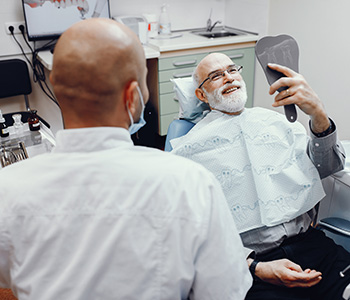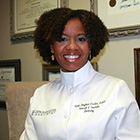Crofton area dentist explains everything you need to know about dentures
Are you considering dentures to replace several missing teeth? If so, Dr. Vickii Bingham-Lester, dentist in the Crofton, MD area, is here to answer all your questions. Below, she explains everything you need to know about dentures, from the process of getting them made to how to care for them at home.

How are dentures made?
Getting dentures is a multi-step process that, in the end, is well worth the wait! Dentures are custom fitted to your mouth so that they have an optimal fit, feel comfortable, and look naturally beautiful. First, Dr. Bingham-Lester will examine your mouth and discuss the pros and cons of your treatment options with you to determine whether dentures are the best option for your individual needs and preferences. There are several different types of dentures that can be used, depending on how many teeth you are missing, whether you want the stability of implants to support them, and other factors. In some cases, immediate dentures can even be made so that you go home with a full set of new teeth the day you have your teeth extracted.
How long does it take to get used to dentures?
Just like any other big change, dentures do take some time to adapt to them. Usually, patients are well-adjusted to their dentures after about 30 days. In the meantime, doing the following can help ease this transition:
- Eat soft, pureed foods for the first few days to give your gums and mouth time to adjust to the dentures before trying to chew with them
- Gradually add in small pieces of easy-to-chew foods, making sure to chew them thoroughly and swallow carefully to avoid choking
- Avoid exceptionally chewy or hard foods, such as steak, raw carrots, and apples, until you are fully adjusted to eating with your dentures
- Swish your mouth with warm saltwater regularly to ease inflammation
- Use small amounts of denture adhesive until you are accustomed to keeping your dentures in place with natural suction
- When you are at home, driving in your car, or alone at other times of the day, practice saying speech sounds that are more difficult with your new dentures and if needed, work with a speech therapist to regain your confidence in speaking again
Will I need to change what I eat?
For the most part, you can enjoy the same foods that you have always loved after you get dentures. You may need to adjust how you eat them, though.
- When you are drinking liquids, don’t keep them in your mouth for an excessive amount of time, because this can loosen your dentures and make them slip
- Be careful with very hot or cold liquids—your natural teeth alert you to these temperatures before they touch your sensitive tongue and gums, but your dentures will not give you the same warning
- Enjoy fresh fruits and vegetables after you have sliced them thinly or chopped them into small pieces
- Eat sticky foods such as grains, cereals, and breads with water or other liquids to help prevent them from sticking to your dentures
- Cut corn on the cob off with a knife before enjoying it
How do I take care of my dentures?

In general, caring for your dentures takes about as much time as taking care of your natural teeth. You should take your dentures out every night before you go to bed and brush them gently with a soft toothbrush or a denture brush and a non-abrasive toothpaste specially designed for dentures. Regular toothpaste is too abrasive and should not be used on dentures. All surfaces of your dentures should be brushed, just like your natural teeth. Then, soak them in a water-based cleansing solution while you sleep. This gives your gums and jawbone a rest from supporting the dentures and helps remove bacteria and debris from the dentures. Rinsing your dentures with plain water after you eat can help keep them sparkling and keep your gums healthy.
What if they don’t seem to fit right anymore?
Due to natural changes that occur in your jawbone, it may become necessary at some point to have your dentures re-fitted to your mouth. This is called a “reline” and the dentist will change the base of your dentures to better fit your gums and bone.
How do I schedule an appointment?
Call us at 410-885-6522! With our conveniently located office in Gambrills, we are here to serve patients in the Crofton, Millersville, Crownsville, and surrounding areas. We love seeing our patients’ dazzling new smiles!







